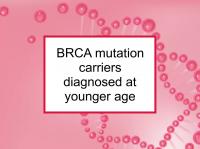A new study has reported that BRCA mutation carriers are diagnosed with breast cancer almost eight years earlier than relatives of the previous generation. Breast cancer susceptibility gene-1 (BRCA1) and breast cancer susceptibility gene-2 (BRCA2) mutation carriers have a high risk of developing breast and ovarian cancers.
To conduct the study, the authors examined age at diagnosis in two generations of families with known BRCA mutations. A total of 106 of the 132 BRCA-positive women with breast cancer who participated in a high-risk program at The University of Texas MD Anderson Cancer Center had a family member in the previous generation who had also been diagnosed with breast cancer or ovarian cancer. Age at diagnosis, type of BRCA mutation, and birth year were recorded. A mathematical anticipation model was used to analyze the data; anticipation refers to the phenotype or cancer coming out earlier per generation.
The median age of cancer diagnosis was 48 years (range: 30-72 years) in the first generation compared to 42 years (range: 28-55 years) in the subsequent generation, a difference of six years. However, using the parametric model to evaluate for anticipation, the estimated change in the expected age at onset for the entire population was 7.9 years.
The authors also found statistically significant earlier ages at diagnosis within subgroups of BRCA1 and BRCA2 mutation carriers, including maternal inheritance, paternal inheritance, breast cancer only, and breast cancer-identified and ovarian cancer-identified families.
The authors conclude that breast and ovarian cancers in BRCA mutation carriers appear to be diagnosed at an earlier age in later generations.
Please see our articles on BRCA mutations and breast cancer diet for BRCA mutation carriers for more information.
